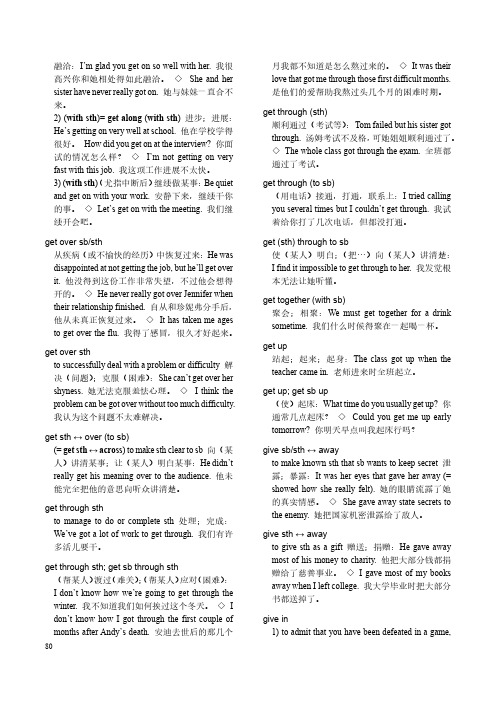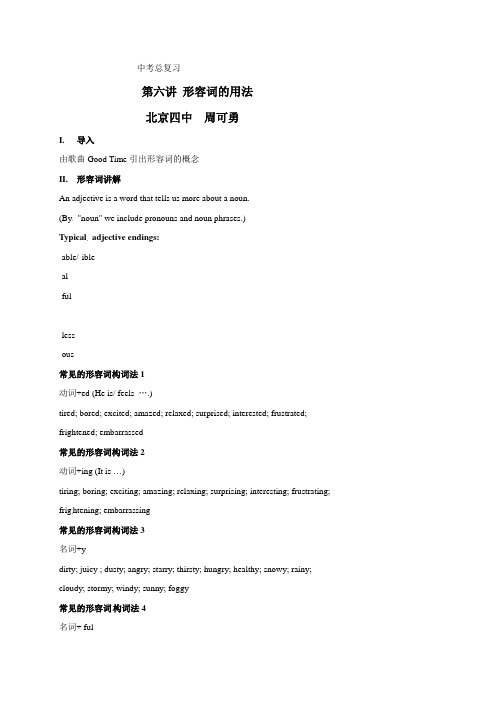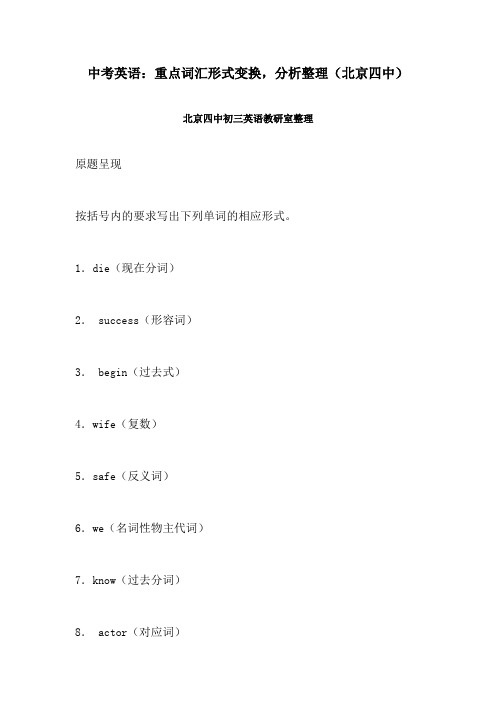北京四中-动词ing
- 格式:doc
- 大小:50.00 KB
- 文档页数:5

一、选择题1.Jack, ________ late for school.A.isn’t B.aren’t C.don’t be D.not be C解析:C【详解】句意:Jack,上学别再迟到。
be late for为固定短语“迟到”。
分析题干可知本句考查祈使句,结合句意可判断应使用祈使句的否定形式,故在be动词前加don’t,故选C。
2.Boys and girls, be quiet, please! I have to tell you.A.important something B.important anythingC.anything important D.something important D解析:D【解析】句意:孩子们,请安静,我有重要的事情要告诉你们。
something某事,是一个不定代词,常用于肯定句中;anything任何事,常用于否定句或疑问句中;important重要的,是一个形容词,修饰不定代词的形容词应放在后面,且这里是一个肯定句,故应选D。
3.—How many students are there in your school?—About .A.eight hundreds B.eight hundred C.eight hundred of D.eight hundreds of B 解析:B【解析】句意:-在你的学校里有多少学生?-大约八百个。
eight hundreds形式错误,hundred百,与基数词搭配时,不用复数;eight hundred八百;eight hundred of和eight hundreds of形式错误,hundred后跟of时,应用复数,前面不能用基数词。
故应选B。
4.—Does your father have an interesting _________?—Yes, he __________ at a TV station.A.work; works B.job; works C.work; jobs B解析:B【解析】句意:——你父亲有一份有趣的工作吗?——是的,他在一家电视台工作。

融洽:I’m glad you get on so well with her. 我很高兴你和她相处得如此融洽。
◇ She and her sister have never really got on. 她与妹妹一直合不来。
2) (with sth)= get along (with sth) 进步;进展:He’s getting on very well at school. 他在学校学得很好。
How did you get on at the interview? 你面试的情况怎么样? ◇ I’m not getting on very fast with this job. 我这项工作进展不太快。
3) (with sth)(尤指中断后)继续做某事:Be quiet and get on with your work. 安静下来,继续干你的事。
◇ Let’s get on with the meeting. 我们继续开会吧。
get over sb/sth从疾病(或不愉快的经历)中恢复过来:He was disappointed at not getting the job, but he’ll get over it. 他没得到这份工作非常失望,不过他会想得开的。
◇He never really got over Jennifer when their relationship finished. 自从和珍妮弗分手后,他从未真正恢复过来。
◇ It has taken me ages to get over the flu. 我得了感冒,很久才好起来。
get over sthto successfully deal with a problem or difficulty 解决(问题);克服(困难):She can’t get over her shyness. 她无法克服羞怯心理。
◇ I think the problem can be got over without too much difficulty.我认为这个问题不太难解决。

中考总复习第六讲形容词的用法北京四中周可勇I.导入由歌曲Good Time引出形容词的概念II.形容词讲解An adjective is a word that tells us more about a noun.(By"noun" we include pronouns and noun phrases.)Typical adjective endings:-able/-ible-al-ful-less-ous常见的形容词构词法1动词+ed (He is/ feels ….)tired; bored; excited; amazed; relaxed; surprised; interested; frustrated; frightened; embarrassed常见的形容词构词法2动词+ing (It is …)tiring; boring; exciting; amazing; relaxing; surprising; interesting; frustrating; frig htening; embarrassing常见的形容词构词法3名词+ydirty; juicy ; dusty; angry; starry; thirsty; hungry; healthy; snowy; rainy; cloudy; stormy; windy; sunny; foggy常见的形容词构词法4名词+ fuluseful; helpful; hopeful; careful; wonderful; beautiful; thankful; thoughtf ul 常见的形容词构词法5名词+lessuseless; hopeless; helpless; careless; wordless; meaningless常见的形容词构词法6名词+lyfriendly; motherly; lively; lovely; weekly; monthly常见的形容词构词法7名词/动词+able / ible名词+alcultural; natural; traditional;national; environmental常见的形容词构词法9动词的被动语态引申为形容词locked; broken; lost; amazedun-unable; unbelievablein-incorrect;im-impossiblethe old; the young;the rich; the poor;the wounded形容词在句子中的位置1. 系动词之后作_______语The house looks cozy.That soup smells good.The days ar e getti ng shorter.2. 名词之前作_______语This is a big tree.3. 动宾短语后作_______语The news made me happy.He always keeps his room clean and tidy.熟练掌握形容词作定语、表语及宾语补足语的用法。

一、选择题1.—The doctor ________ to examine my grandpa. What happened to him, Mom?—He hurt himself while working in the garden.A.dropped by B.called inC.was dropped by D.was called in D解析:D【详解】句意:——医生被请来给我爷爷检查身体。
他怎么了,妈妈?——他在花园里干活时伤到了自己。
考查时态与语态,drop by顺便访问;call in叫⋯进来,召来。
观察句子,应该是医生被叫来,那么应该用被动语态,故选D。
2.— Doctor, do you think I have got a bad cold?—Maybe. But I can’t say that before I ______ you.A.create B.warn C.examine D.prove C解析:C【解析】【详解】句意:——医生,你认为我得了重感冒吗?——也许,但在我检查你之前还不能确定。
考查动词辨析。
create“创造,产生”;warn“警告,告诫”;examine“检查”;prove“证明,证实”。
结合句意可知填examine,选C。
3.To start ______, you need a map.A.at B.for C.with D.off C解析:C【解析】【详解】句意:首先,你需要一张地图。
考查介词。
A. at在;B. for为了,对于;C. with和,用,有;D. off远离,离开。
短语to start with:开始,首先,第一。
结合句意可知填with;选C。
【点睛】(1)Start with:以…开始,从…着手;有…作为开头,例如,A thousand li journey starts with the first step.千里之行,始于足下。

中考英语:重点词汇形式变换,分析整理(北京四中)北京四中初三英语教研室整理原题呈现按括号内的要求写出下列单词的相应形式。
1.die(现在分词)2.success(形容词)3.begin(过去式)4.wife(复数)5.safe(反义词)6.we(名词性物主代词)7.know(过去分词)8.actor(对应词)9.direct(名词)10.thirty(序数词)积少成多,中考重点词汇形式变换,你总结了吗正确答案1.dying2.successful3.began4.wives5.dangerous6.ours7.known8.actress9.director/direction10.thirtieth积少成多,中考重点词汇形式变换,你总结了吗拓展延伸1.动词变现在分词时,以ie结尾,需要把ie变y,再加ing.例如:lie——lying;tie——tying;die——dying等。
2.success succeed successful successfullysuccess n 既做可数名词也做不可数名词。
当其作可数名词时,意思为成功,胜利,发财,成名。
具体用法如下:success in sth/doing sth,have much(little etc.) success in sth ,the key to success 。
做不可数名词时,意思为,成功的人或事,make a success of sth。
succeed为动词,初中的常用用法:succeed in doing sthsuccessful为形容词,用法:be successful in sth/doing sth ,be successful at sth/doing sth3.begin 其现在分词:beginning;过去式:began ;过去分词:begun;近义词start;名词beiginning开始,beiginner初学者。

高中语法第十讲非谓语动词之动词-ing形式Ⅰ. 动词-ing的形式:♦以write为例,写出-ing形式的变化形式:一般式的主动语态:___________ 一般式的被动语态:____________完成式的主动语态:___________ 完成式的被动语态:_____________Ⅱ. 动词-ing形式的基本用法:1. 作主语:如果其结构较长,可用______作形式主语,而将作主语的-ing形式后置。
2. 作表语。
3. 作宾语:1)-ing形式可作及物动词、短语动词、或______的宾语,形容词______, ______等的宾语,另外还用于结构“do+ 限定词(my,some, any, the 等)+ -ing”,表示“做……事”之意,例如:_______________(购物)。
2)动词–ing 作宾语,如有补足语,用it 作为________,而将-ing 后置。
3)加-ing作宾语的动词常见的有:______________________________________________________________________________________ ___________________________________________________________ ____※注意既可加-ing形式,也可用不定式的动词的区别。
用所给单词的正确形式填空,并说明每组小题选择答案的原因:✧We are beginning/starting _______ (work) hard.They got up, beginning/starting _______ (study).✧He hates _______ (talk) with strangers.I love _______ (show) you around our school.✧After eating two burgers, he went on _______ (talk) about hisexperience in Norway.Although it has been two hours, he is still going on _______ (talk)about his life.✧The movie is on. Please stop _______ (make) any sound.He didn’t want to stop _______ (move) back to China.✧I remember _______ (send) the email. I don’t know why he stillhasn’t got it.Remember _______ (write) every detail on your paper so thatnothing can be missed.✧I am terribly sorry to have forgotten _______ (send) the email.I forgot _____ (send) the email. =I forgot whether I sent the email or not.He totally forgot that he _______ (send) the email.✧Please don’t cry. I didn’t mean _______ (hurt) you.Price of daily food is going up, which means _______ (pay) more money.✧I regret _______ (inform) you that you failed in the exam.Now she has already regretted _______ (marry) that rich man who was as old as her father.✧He has been trying _______ (lose) some weight but in vain.He tried _______ (call) him but no one answered.✧He is afraid _______ (go) back home because he is afraid of_______ (punish) by his parents.(补充:dislike在传统语法中多接-ing形式作宾语)4. 作定语:1)-ing 作定语时,被-ing所修饰的名词就是该-ing的_________。
中考总复习第十二讲非谓语动词北京四中周可勇I.导入由一句谚语引出非谓语动词的概念II.非谓语动词讲解非谓语动词:动名词及分词When one verb is followed by another, the second verb can either be an infinitive or an –ing form.Some verbs can be fo llowed by only an infinitive, others by only an–ing form.I want to speak to the ma nager.She’s learning to ride a horse.“want〞, “learn〞and “offer〞are followed by to + infinitive.Other verbs in this group:afford, agree, ask, hope, prepare, promise, pretend, refuseVerbs of thinking and feeling:choose, decide, expect, forget, hate, hope, intend, learn, like, love, mean, plan, prefer, remembe r, want, would like, would loveVerbs of saying:agree, promise, refuseThey decided to start a business together.Remember to turn the lights off.We use the to -infinitive to express purpose (to answer "Why...?").He bought some flowers to give to his wife.He locked the door to keep e veryone out.We set off early in order to avoid the traffic.They spoke quietly in order not to wake the children.We can also say so as to or so as not to.We set off early so as to avoid the traffic.They spoke quietly so as no t to wake the children.Some verbs are followed by a direct object and the infinitive:advise, ask, encourage, invite, order, persuade, remind, tell, warn, expect, would prefer, want, would likeWe often use a to -infinitive as a postmodifier after an indefinite pronoun: something to drinksomething to eatWe can also use a to -infinitive after words like what, who, when, where and how.We haven't decided when to leave yet.Could you tell me how to get there by bus?☆练一练:中考真题1. — Ex cuse me, could you tell me how _____ to Beijing Zoo?— Well, you may take Bus No.27.A. getB. getsC. gettingD. to get2. G ranny often tells us _____ water i n our daily life.A. saveB. savingC. to saveD. saves3. The teacher asked Ben_____ a difficult question in class.A. answerB. answeringC. to answerD. answered 参考答案:中考真题1. D2. C3. C。
动词是英语词汇中的核心,而动词及其构成的短语一直是高考中的热点和难点。
它的用法最灵活,其种类比较多,形式复杂。
每年高考中对动词短语和动词的考查都会出现2〜4道试题,难度也大。
2018年高考中特别要注意动词及其和介词、副词的搭配,以及构成的固定短语,要注意这些短语的意思,同时要在具体的语境中灵话地加以使用。
动词及其词组的灵活运用是英语的特色之一,也是学生学习中的难点,因此每年均为测试的重点。
在历年高考试题中动词所占的比例最大,设题时往往都是给出四个不同的动词或短语来测试考生在具体语境中对动词短语意义的理解和运用。
考点1 动词词义辨析这类试题的四个选项是在结构上都很相近的动词。
要做好这类试题,必须明确各个动词的词义和用法,然后根据题意需要选用合适的动词。
【典例】I’m afraid you will have to pay an extra amount to __________the cost of insurance.A. coverB. spendC. fillD. offer【答案】A【解析】句意:恐怕你要付额外的钱来支付保险费。
此处cover足以支付;spend花费;fill 充满;offer提供。
根据句意,故选A。
考点2 近义动词辨析这类试题的四个选项无论在意义上还是在结构上都是很相近的动词。
面对这类试题,必须要从四个动词的语义差别、用法特点等入手才能选出符合题意的动词。
【典例】Jackson refused to accept the reward because he th ought he didn’t ____the honor.A. hold.B. obtain.C. deserve.D. achieve.【答案】C【解析】此处hold握住;obtain获得;deserve值得,相配;achieve取得成就。
句意:杰克逊拒绝领奖,是因为他觉得自己不配(deserve)得到这个荣誉。
北京四中高考英语常考短语一、短语动词一些动词与介词或副词等连用在一起构成固定词组,叫做短语动词。
有些短语动词相当于及物动词,有些则相当于不及物动词。
短语动词的结构有:1.“动词+介词”(相当于及物动词)He looked after us very well. 他把我们照顾得很好。
2.“动词+副词”(包括两种情况)a)用作不及物动词The engine broke down. 发动机坏了。
b)用作及物动词Hurry up! Put your coat on!快点!把外衣穿上!注:“动词+副词”型短语动词的宾语若为代词,必须放在副词前,若为名词则放在副词前后均可。
give it up 放弃它give up the chance/give the chance up 放弃机会本书中,对这类短语动词标示为:give sth ↔ up3.“动词+副词+介词”(相当于及物动词)I look forward to hearing from you. 盼望收到你的来信。
4.“动词+名词+介词”(相当于及物动词)Please pay attention to what I’m saying. 请注意听我讲的话。
5.“be+形容词+介词”She is fond of music. 她爱好音乐。
abandon yourself to sth陷入,沉湎于(某种情感):He abandoned himself to despair. 他陷入绝望。
account for sth1) 解释;说明:How do you account for the fact that the box has disappeared? 盒子不见了,你如何解释?2) 是…的原因:The poor weather may have accounted for the small crowd. 天气不好可能是人来的少的原因。
3)(数量上、比例上)占:Afro-Americans account for 12% of the US population. 非洲裔美国人占美国人口的12%。
Ⅰ. 用所给动词的正确形式填空:1. ______ (see) from the mountain, we can see the river running through the city.2. I am looking forward to _______ (see) you again.3. The boy was lucky enough to escape ________ (punish).4. I apologize to you for ___________(not tell) you the truth immediately.5. It’s no use ________ (try ) to make me believe you.6. The bottle _________ (contain) the poison was sent to the laboratory.7. ______ (lose) her new bicycle made Mary so upset.8. ______________ ( receive) a reply , he decided to write again.9. We watched the army _______ (march) down the street towards the park.10. Tom’s _______ (attend) the meeting made everyone there very happy.11. The teacher asked me _________ (hand ) in my homework.12. We don’t allow __________ (smoke), so you must go to the smoking room.13. We don’t allow you _________ (smoke) here.14. Nobody are allowed __________ (smoke) here.15. _______ (interest) in the Koories for many years, I decided to learn their language.Ⅱ. 用非谓语动词把下面复合句和并列句改成简单句。
1. Since I don’t know her address, I can’t get in touch with her.________________________________________________2. We have come here in order that we can improve our English.________________________________________________3. They came into the room and they were singing and talking.________________________________________________4. When she heard the news, she couldn’t help laughing.________________________________________________5. After he closed the windows, he went home.________________________________________________6. When we had finished the work, we went out to play.________________________________________________7. If the weather permits, we’ll go out on an outing.________________________________________________8. That Sam came to school late made his teacher quite angry.________________________________________________Ⅲ. 单项选择。
1. —Did you listen to the lecture?—Y es, I have never heard such a _____ one.A. more excitingB. more excitedC. most excitingD. most excited2. _____ any biscuits that morning, we had nothing to eat.A. Not bakingB. Not having bakedC. Not being bakedD. Not having been baked3. ____ with a difficult situation, Arnold decided to ask his boss for advice.A. To faceB. Having facedC. FacedD. Facing4. _____ the child to bed, she began to correct the pupil’s exercise.A. SendingB. Being sentC. SentD. Having sent5. There are some differences between ocean water and rain water. _____ ocean water, rain water is light.A. Comparing toB. Compare withC. Compared withD. Comparing with6. While building a tunnel through the mountain, _______.A. an underground lake was discoveredB. there was an underground lake discoveredC. a lake was discovered underground.D. the workers discovered an underground lake7. ______ these pictures, I couldn’t help thinking of those days when I was in Beijing and ____from the top of a thirty-storey building, Beijing looks more magnificent.A. Seeing; seenB. Seen; seeingC. Seeing; seeingD. Seen; see8. ________from heart trouble for years,Professor White has to take some medicine with him wherever he goes.A.Suffered B.Suffering C.Having suffered D.Being suffered9. He sent me an e-mail,________to get further information.A.hoped B.hoping C.to hope D.hope10. Do you wake up every morning _______ energetic and ready to start a new day?A. feelB. to feelC. feelingD. felt11. Alice returned from the manager’s office,______me that the boss wanted to see me at once.A.having told B.tells C.to tell D.telling12.________the programme,they have to stay there for another two weeks.A. Not completing B.Not completedC. Not having completed D.Having not completed13. The news reporters hurried to the airport,only ________the film stars had left.A.to tell B.to be told C.telling D. told14. Having been ill in bed for nearly a month,he had a hard time ________the exam.A.pass B.to pass C.passed D. passing15. Having been attacked by terrorists,________.A.doctors came to their rescue B.the tall building collapsedC.an emergency measure was taken D.warnings were given to tourists16. The bell ________the end of the period rang,________our heated discussion.A.indicating;interrupting B.indicated;interruptingC.indicating;interrupted D.indicated:interrupted17. When you find something in your writing that needs ______, you should mark it on the paper.A. to be correctingB. correctC. to correctD. correcting18. ______ the way to take, the traveller went on his journey.A. TellingB. Having toldC. Having been toldD. Have told19. _______, we left off our work.A. After setting the sunB. Having set the sunC. The sun having setD. Being the sun set20. Y ou must be careful when ______ on the highway.A. you drivingB. are drivingC. drivingD. you were driving21. People appreciate _______ with him because he has a good sense of humour.A. to workB. to have workedC. workingD. having worked22. The fighting broke out on April 13, _______ 5 innocent people with more than 30 _______.A. killed, injuredB. killing, injuredC. killed, injuringD. killing, injuring23. He felt lonely in the first month abroad, but after a time he got___alone and even got__ itA. used to living; to enjoyB. used to live; to enjoyC. using to live; enjoyingD. to be used to living; enjoying24. I feel upset,for there are so many troublesome problems __________.A. remaining to settleB. remained to settleC. remaining to be settledD. remained to be settled25. There’s a man at the reception desk who seems very angry and I think he means _____ trouble.A. makingB. to makeC. to have madeD. having made答案与解析Ⅰ. 用所给动词的正确形式填空:1. Seeing2. seeing3. being punished4. not telling5. trying6. containing7. Losing8. Not having received9. marching10. attending11. to hand12. smoking13. to smoke14. to smoke15. Having been interested难题解析:如何确定v-ing的形式:一看动词与逻辑主语的关系是主动还是被动,二看动词在谓语动作之前、之后或同时发生。